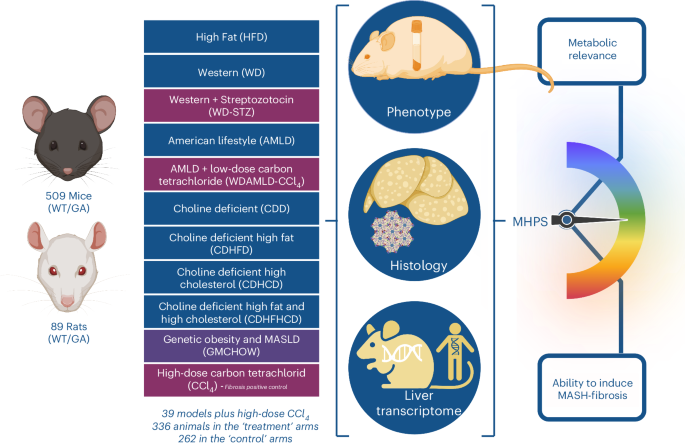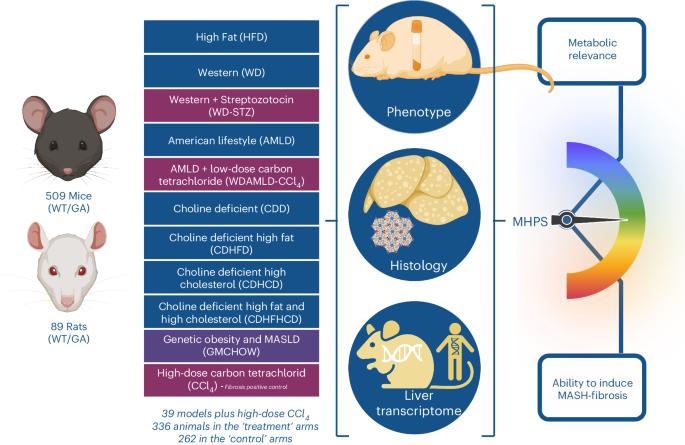An unbiased ranking of murine dietary models based on their proximity to human metabolic dysfunction-associated steatotic liver disease (MASLD)
IF 18.9
1区 医学
Q1 ENDOCRINOLOGY & METABOLISM
引用次数: 0
Abstract
Metabolic dysfunction-associated steatotic liver disease (MASLD), previously known as non-alcoholic fatty liver disease, encompasses steatosis and metabolic dysfunction-associated steatohepatitis (MASH), leading to cirrhosis and hepatocellular carcinoma. Preclinical MASLD research is mainly performed in rodents; however, the model that best recapitulates human disease is yet to be defined. We conducted a wide-ranging retrospective review (metabolic phenotype, liver histopathology, transcriptome benchmarked against humans) of murine models (mostly male) and ranked them using an unbiased MASLD ‘human proximity score’ to define their metabolic relevance and ability to induce MASH-fibrosis. Here, we show that Western diets align closely with human MASH; high cholesterol content, extended study duration and/or genetic manipulation of disease-promoting pathways are required to intensify liver damage and accelerate significant (F2+) fibrosis development. Choline-deficient models rapidly induce MASH-fibrosis while showing relatively poor translatability. Our ranking of commonly used MASLD models, based on their proximity to human MASLD, helps with the selection of appropriate in vivo models to accelerate preclinical research. The LITMUS consortium provides a resource of rodent MASLD models benchmarked against metabolic, histologic and transcriptomic features that are relevant for human MASLD. The work is useful for selecting relevant rodent models for studying this common disease.


根据与人类代谢功能障碍相关性脂肪性肝病(MASLD)的接近程度对小鼠饮食模型进行无偏见排序
代谢功能障碍相关性脂肪性肝病(MASLD)以前称为非酒精性脂肪肝,包括脂肪变性和代谢功能障碍相关性脂肪性肝炎(MASH),可导致肝硬化和肝细胞癌。MASLD的临床前研究主要在啮齿类动物中进行;然而,最能再现人类疾病的模型尚未确定。我们对小鼠模型(大多为雄性)进行了广泛的回顾性研究(代谢表型、肝脏组织病理学、以人类为基准的转录组),并使用无偏见的 MASLD "人类接近度评分 "对它们进行排序,以确定它们的代谢相关性和诱导 MASH 纤维化的能力。在这里,我们表明西方饮食与人类MASH密切相关;需要高胆固醇含量、延长研究时间和/或对疾病促进途径进行遗传操作,才能加剧肝损伤并加速显著(F2+)纤维化的发展。胆碱缺乏模型可迅速诱导MASH-纤维化,但其可转化性相对较差。我们根据常用的 MASLD 模型与人类 MASLD 的接近程度对其进行了排序,这有助于选择合适的体内模型来加速临床前研究。
本文章由计算机程序翻译,如有差异,请以英文原文为准。
求助全文
约1分钟内获得全文
求助全文
来源期刊

Nature metabolism
ENDOCRINOLOGY & METABOLISM-
CiteScore
27.50
自引率
2.40%
发文量
170
期刊介绍:
Nature Metabolism is a peer-reviewed scientific journal that covers a broad range of topics in metabolism research. It aims to advance the understanding of metabolic and homeostatic processes at a cellular and physiological level. The journal publishes research from various fields, including fundamental cell biology, basic biomedical and translational research, and integrative physiology. It focuses on how cellular metabolism affects cellular function, the physiology and homeostasis of organs and tissues, and the regulation of organismal energy homeostasis. It also investigates the molecular pathophysiology of metabolic diseases such as diabetes and obesity, as well as their treatment. Nature Metabolism follows the standards of other Nature-branded journals, with a dedicated team of professional editors, rigorous peer-review process, high standards of copy-editing and production, swift publication, and editorial independence. The journal has a high impact factor, has a certain influence in the international area, and is deeply concerned and cited by the majority of scholars.
文献相关原料
| 公司名称 | 产品信息 | 采购帮参考价格 |
|---|
 求助内容:
求助内容: 应助结果提醒方式:
应助结果提醒方式:


